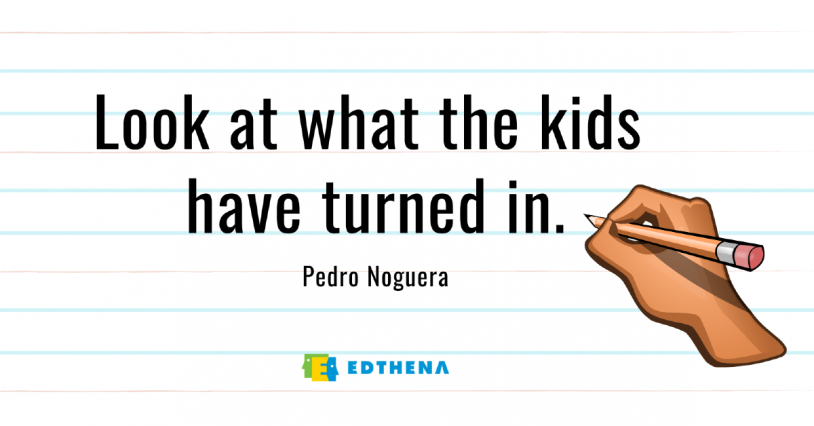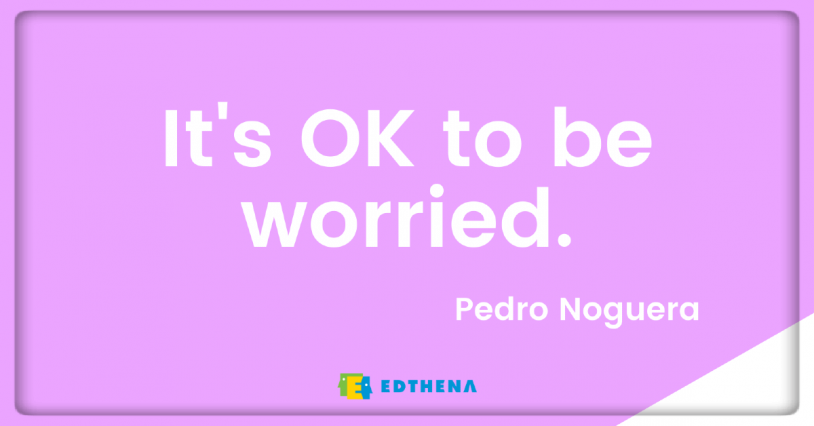Pedro Noguera Discusses Teacher Reflection and Why Worrying is OK
In this PLtogether Lounge Talk, Edthena founder & CEO Adam Geller interviewed Dr. Pedro Noguera, Dean of the USC Rossier School of Education. A scholar and expert on issues of equity in education, Pedro Noguera talked about teacher effectiveness and reflection.
Watch the interview video above, and read on for highlights of the conversation.
Teachers’ self-reflections are integral to their practice

Pedro Noguera began by reminding us that though teacher evaluation has been a hot topic in recent years, reflection on effectiveness really begins with the teacher themselves. Reflecting after each lesson and building reflective practices into regular habits are what enable growth in educators’ craft and professionalism.
Reflection on student work is also key. Pedro Noguera emphasized, “[Look at] what the kids have turned in. What does that tell you about your effectiveness as a teacher, about what’s getting through what’s not getting through, which kids are getting it, which kids are not.”
This thoughtful approach and the potential insight gained from student work comes down to more than grading. Teachers must really ask themselves what students have demonstrated that they learned.
Are teachers reflecting often?
When asked if the pandemic has given teachers more opportunity to self-reflect, Pedro answered succinctly, “Not enough.” Learning how to do online teaching and do it well has taken up most of educators’ time.
Even as online teaching phases out, Pedro warned, “If we don’t start to think now about how education can be different and better after this pandemic … we’ll miss out on the opportunity that this has created.”
Moving past logistical challenges, there is still much improvement to be made in boosting student motivation. This is where self-reflection is key.
After determining how (and why) students are or are not engaging, there are many resources to be found for increasing student engagement. Pedro Noguera suggested also searching for resources that can help such as videos for conducting mental health check-ins with students, building relationships with kids, or designing engaging Socratic seminars.
Interacting with students and the debate between depth versus breadth

Also a concern is the constant pressure for teachers to cover material. Educators know well the urgency around getting through lots of content with not enough time.
But to this Pedro stated, “Learning is best when it’s interactive.” Students need time to process information, try out and experiment with what they’re learning, ask questions and get feedback from their teachers.
Depth versus breadth is an age-old debate.
Pedro reminded us, “We need to be clear about what’s most important.” What content needs to be covered more deeply? What are the essential skills needed within a topic for a student to succeed in that area at later levels?
This reflection on the material being taught is critical. When teachers know what is most important for students to understand and retain, deeper learning can take place.
Hey teachers: It’s OK to worry
With so much to reflect on, teachers often also have many uncertainties and worries. Pedro Noguera doesn’t think these should be dismissed. He said, “Sometimes our fears are legitimate.”
Instead of saying not to worry, which is unrealistic, it’s OK to acknowledge challenging moments and focus on how to take care of ourselves and each other. Perhaps that is the most important reward of reflection — for educators to not only improve student engagement and strong teaching but to also think about how they can stay in this work for the long haul.
Missed our last conversation with Pedro Noguera? Find it here!

